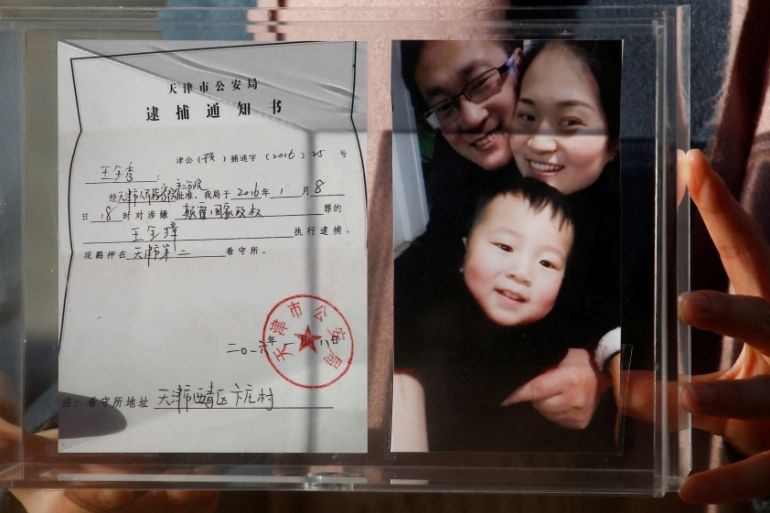China opens trial of prominent rights lawyer amid tight security
Wang Quanzhang, who defended political activists and victims of land seizures, is accused of subverting state power.

Chinese police have locked down a court in the northern city of Tianjin at the start of the trial of Wang Quanzhang, a prominent human rights lawyer who is accused of subverting state power.
Wang, who took on sensitive cases of complaints of police torture and defended practitioners of the banned Falun Gong spiritual movement, went missing in August 2015 during a sweeping crackdown on rights activists.
Most cases from that summer, known as the 709 cases for the first day of detentions on July 9, 2015, have concluded. Wang, however, was incommunicado for more than 1,000 days.
An investigation said he had “for a long time been influenced by infiltrating anti-China forces” and had been trained by overseas groups and accepted their funding, according to a copy of the indictment seen by Reuters news agency.
Police outside the court in Tianjin told reporters they could not get near the building because it was a closed trial, according to Reuters.
Yang Chunlin, an activist who has previously been jailed for subversion, stood opposite the courthouse shouting “Wang Quanzhang is a good person” and “I support Wang Quanzhang” before plainclothes agents wrestled him into a car and sped away.
Another man holding up a sign that said “release innocent Wang Quanzhang” was also taken away by local authorities, a witness told AFP.
Rights group Amnesty International identified the man as Zhang Zhecheng, a rights activist from Jiangxi in central China.
|
|
There were also several Western diplomats outside the courthouse, who were not allowed inside.
‘Sham trial’
The indictment says Wang worked with Peter Dahlin, a Swedish rights worker who was held in China for three weeks before being deported in 2016, and others to “train hostile forces”, as well as actively providing investigative reports overseas.
It also says Wang had hyped up and distorted the facts in his online statements about the case of a policeman who killed a petitioner in Heilongjiang in 2014 and of “cults” that he had defended.
Dahlin, now in Spain’s capital, Madrid, said on Twitter they had kept all documentation dating back to 2009 “and will release anything needed to dispel that it constitutes subverting state power”.
Following indictment for #WangQuanzhang, incl his work with 'JDI' (ChinaAction), we have kept all documentation – tens of thousands of files – all back to 2009, and will release anything needed to dispel that it constitutes subverting state power. pic.twitter.com/esxnh6RBsQ
— Peter Dahlin (彼得·达林) (@Peterinexile) December 25, 2018
The trial could last just a single day, although a verdict may not come immediately. Western diplomats were expected to be outside the court.
Amnesty International said Wang’s trial was a “cruel charade”.
“This is a sham trial in which Wang Quanzhang is being persecuted only for peacefully defending human rights,” said Doriane Lau, China researcher at Amnesty International.
![Li Wenzu has shaved her head in protest to her husband's detention [Thomas Peter/Reuters]](/wp-content/uploads/2018/12/48624a8f1b4149e58a82d216a330a18e_18.jpeg)
Wang’s wife, Li Wenzu, says she has been unable to visit her husband since he went missing. She said seven lawyers she appointed to try to represent Wang had also been unable to visit him.
Li, who last week shaved her head in protest at her husband’s detention, on Tuesday said authorities have placed her under de facto house arrest to stop her from attending his trial
She was quoted as saying by AFP news agency that there were “more than 20” security personnel outside her Beijing apartment by early afternoon.
One of them explicitly told her not to visit Tianjin, she wrote on social messaging app WeChat.
“I wish I could grow a pair of wings, free and unconstrained, and fly freely, fly to Tianjin”, Li said.
It was not possible to reach the State Security Ministry for comment because it has no website or publicly available telephone number. Local police in Beijing did not immediately respond to news agencies’ request for comment.
Chinese President Xi Jinping has strengthened efforts to quash dissent since coming to power six years ago, with hundreds of rights lawyers and activists arrested and dozens jailed.
China routinely rejects foreign criticism of its human rights record, saying all Chinese are treated equally in accordance with the law and that foreign countries have no right to interfere.